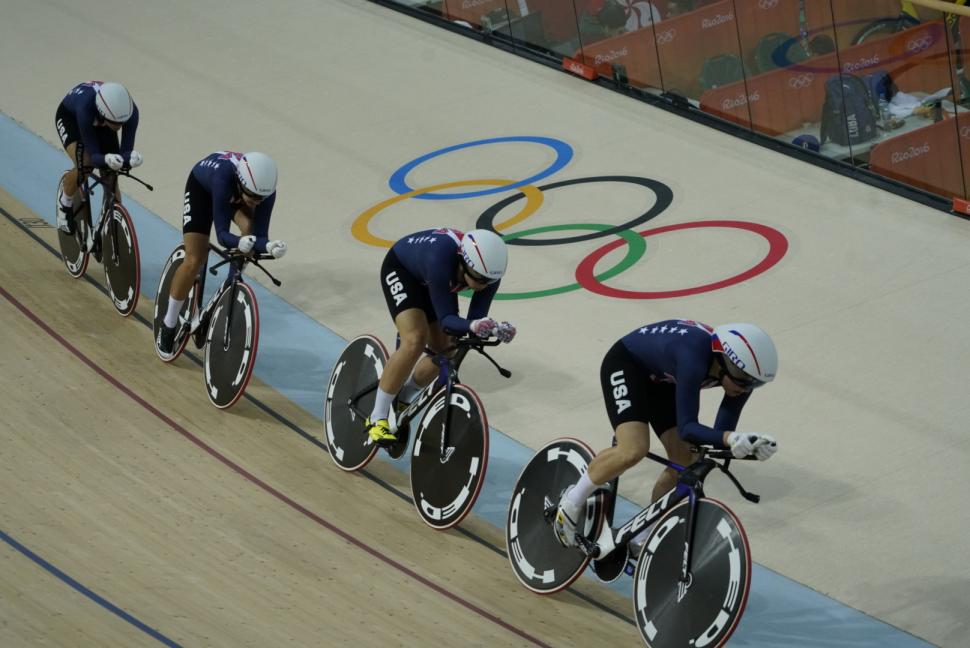- News
- Reviews
- Bikes
- Components
- Bar tape & grips
- Bottom brackets
- Brake & gear cables
- Brake & STI levers
- Brake pads & spares
- Brakes
- Cassettes & freewheels
- Chains
- Chainsets & chainrings
- Derailleurs - front
- Derailleurs - rear
- Forks
- Gear levers & shifters
- Groupsets
- Handlebars & extensions
- Headsets
- Hubs
- Inner tubes
- Pedals
- Quick releases & skewers
- Saddles
- Seatposts
- Stems
- Wheels
- Tyres
- Tubeless valves
- Accessories
- Accessories - misc
- Computer mounts
- Bags
- Bar ends
- Bike bags & cases
- Bottle cages
- Bottles
- Cameras
- Car racks
- Child seats
- Computers
- Glasses
- GPS units
- Helmets
- Lights - front
- Lights - rear
- Lights - sets
- Locks
- Mirrors
- Mudguards
- Racks
- Pumps & CO2 inflators
- Puncture kits
- Reflectives
- Smart watches
- Stands and racks
- Trailers
- Clothing
- Health, fitness and nutrition
- Tools and workshop
- Miscellaneous
- Buyers Guides
- Features
- Forum
- Recommends
- Podcast
news
 Kelly Catlin heads USA team pursuit squad at Rio 2016 (licensed CC BY SA 4.0 by Colin333)
Kelly Catlin heads USA team pursuit squad at Rio 2016 (licensed CC BY SA 4.0 by Colin333)Family of track cyclist Kelly Catlin donates her brain for research into concussion
The family of three-time world champion track cyclist Kelly Catlin have donated her brain to medical researchers to try and establish whether concussion was a factor in her decision to take her own life last week.
The 23-year-old’s brain has been given to Boston University's Chronic Traumatic Encephalopathy (CTE) Center, reports the Denver Post, which adds that clinical and pathological research could take up to 12 months to complete.
Her father Mark Catlin said: “Our family decided to have a neuropathologic examination performed on Kelly’s brain to investigate any possible damage caused by her recent head injury and seek explanations for recent neurologic symptoms.”
The CTE Center, which has a ‘brain bank’ comprising more than 600 brains, says it is “the largest tissue repository in the world focused on traumatic brain injury,” with brains of deceased athletes “examined neuropathologically for evidence of CTE or other disorders of the central nervous system.”
Catlin was found dead in her room at Stanford University in California last Thursday. She had recently written of her struggles to balance her postgraduate studies with her successful career in cycling, which saw her help the USA win three team pursuit world titles from 2016-18 as well as Olympic silver in Rio three years ago.
> Three-time world champion Kelly Catlin dies aged 23
Since her death, members of her family have said that they became concerned about changes in her personality since she sustained concussion in a crash in December, and have revealed that she attempted suicide for the first time in January.
Retired pathologist Mr Catlin said: “She was not the Kelly that we knew. She spoke like a robot. We could get her to talk, but we wondered, ‘what has happened to our Kelly?'
“Everything was open to her, but somehow her thinking was changed and she couldn’t see beyond, I guess, her depression.
“After her concussion, she started embracing nihilism. Life was meaningless. There was no purpose. This was a person with depression.
“For her, she could no longer concentrate on her studies or train as hard. She couldn’t fulfill what she felt were her obligations to herself, she couldn’t live up to her own standards.
“She couldn’t realise that what she needed to do was get away and rest, heal. We were all searching for the magic words, that life was worth living,” he added.
Anyone feeling emotionally distressed or suicidal can call Samaritans for help on 116 123 or email jo [at] samaritans.org in the UK. In the US, call the Samaritans branch in your area or 1 (800) 273-TALK.
If I had to pick an annual race (bar Covid) I'd go for Paris-Roubaix....
Great question! They are for MTB. Not sure for road.
Remaining articulate, intelligent and calm throughout like that whilst somebody is intentionally being threatening and abusive to not just yourself...
I kind of agree with that too, though the cost is probably not even a blip compared to their other costs. What would be interesting is comparing...
I share that hope too. I think it's slightly more complicated as the lower courts ordered that he had to be returned and now the Supreme Court have...
Although since September:...
I've got a pair of these shoes in the wide fitting and they're very comfortable. I also bought the Vaypor inner soles to go with them which come...
I think it's also worth noting that shoe fits change between shoes within the same brand's range - for example, my bike fitter told me that my...
Seems a bit of a missed opportunity with such a deep unit not to include a little side window for better coverage....
No video of the pro-am bike race? Shame.